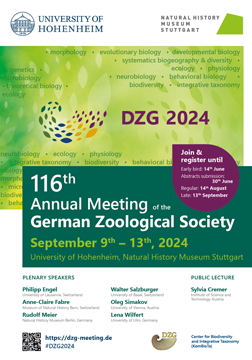Using high-throughput species discovery with robots and Nanopore sequencing to overcome taxon biases in biodiversity science
Rudolf Meier
Natural History Museum Berlin
Humboldt-Universität Berlin
Germany
Professor

Thurs | September 12th, 2024
09.00 – 10.00 am
University of Hohenheim
BIO building
Audimax
Biodiversity science neglects hyperdiverse arthropod clades, although they are species-rich and provide many ecosystem services ('dark taxa').
In my keynote, I highlight that over half of the diversity of flying insects belongs to only 20 family-level clades, a pattern consistent across habitats and continents. I then demonstrate how little is known about most of these clades by comparing the number of described species with the number of species in samples from all over the world. This leads to the conclusion that we need new approaches for such taxa.
One key innovation is a robot ('DiversityScanner') jointly developed with KIT that detects, images, and measures individual specimens prior to placing them into microplates for DNA barcoding with Nanopore sequencers. Morphological data collected for selected specimens can then be used to validate 'barcode clusters' as species, thus readying them for identification or description.
I will show how this approach significantly accelerates the transformation of dark taxa from obscurity to sufficiently well known for biomonitoring. Furthermore, I will illustrate how AI identification tools for a relatively small number of species can eliminate the need to barcode 50% of all specimens in bulk insect samples. In conclusion, I thus advocate for confronting the darktaxon problem in biodiversity science through high-throughput integrative taxonomy, facilitated by new technologies, and applied to one local sample at a time.



